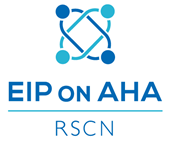RSCN Involvement in EU projects : an update
The RSCN is a partner on a number of EU and EIT Health funded projects:
DigitalHealthEurope
The project will support large-scale deployment of digital solutions for person-centred integrated care by identifying, analysing, and facilitating the replication of highly impactful best practices, utilising the consortium’s exceptional expertise on knowledge management and impact assessment (EIP on AHA repository of innovative practices, MAFEIP), twinning schemes, and mobilisation of stakeholders. A marketplace will enable organisations to find suitable partnerships. At least 46 twinnings ranging from adaptation of impactful best practices to full adoption will be carried out.
A funding advice service and capacity building framework will be provided to further stimulate deployment and scale up.
The RSCN will closely support tasks related to identifying solutions for person-centred integrated care and the twinning marketplace scheme. It will also contribute to the development of the collaboration platforms on citizens’ access to health data and on citizen-healthcare provider interaction. The RSCN will also help to assess the characteristics and the impact of the innovative approach and will facilitate partnerships with other regions for scaling up.
GATEKEEPER
The main objective of the Project is to create a GATEKEEPER, that connects healthcare providers, businesses, entrepreneurs, elderly citizens and the communities they live in, in order to originate an open, trust-based arena for matching ideas, technologies, user needs and processes, aimed at ensuring healthier independent lives for the ageing populations.
By 2022, GATEKEEPER will be embodied in an open source, European, standard-based, interoperable and secure framework available to all developers, for creating combined digital solutions for personalised early detection and interventions.
The RSCN will support engagement and co-creation of the ecosystems, the definitoion, co-ordination and evaluation of Twinnings to support scaling up, the development of the business model, governance for procurement, and the dissemination and networking activities for project outreach.
WE4AHA
WE4AHA project pursues the following overall objectives:
Objective 1: to provide centralised, integrated and continued support to administration, external communication and coordination of the stakeholder groups and partners engaged in the development and implementation of the three addressed “pillar” activities: I2M, Blueprint and EIP on AHA.
Objective 2: to extend the reach to external stakeholders, engaging them in the three pillars by promoting their mobilisation, further cooperation, networking and synergies amongst them, in order to leverage knowledge, resources and investments for digital innovation in AHA.
Objective 3: to promote an effective and increased large-scale uptake of digital solutions for Active and Healthy Ageing by accelerating the progress on favourable framework conditions established by the aforementioned pillars.
Objective 4: to foster the policy vision, the unexploited potential and the increasing market opportunities of digital innovation for Active and Healthy Ageing, through the identification of synergies, the establishment of communication links and by building on relevant research and innovation activities from H2020 and other EU, national and international programmes targeting AHA.
The RSCN was recently approved as official partner for the remainder of the project. Our role will be to Support the Reference Sites activities, and contribute to the communication and dissemination activities.
VIGOUR
The Project will support care authorities in progressing the transformation of their health and care systems to provide sustainable models for integrated care which will facilitate identification of good practice and scaling-up. This will be achieved through the delivery of an evidence based integrated care support programme.
The RSCN will offer the project first-hand access not only to regions which are innovation leaders, but also to slower-performing regions in the area of integrated care. This will help in identifying best practices, the updating of existing guidance material, and the conduction of twinning activities. In particular the RSCN will lead on a “Twinning Scheme”, and the development of “Wider Scaling-up Guidance“.
Health Loneliness
The Project will develop a combined education and intervention program based on the strong involvement of seniors and stakeholders to minimise the effects of loneliness in the elderly and to raise awareness about it in the social sector and society. There will be a special focus on disseminating the training programs and the findings at local level.
The RSCN will contribute to the evaluation, dissemination and the assurance of project’s scalability; in particular the development of a dissemination strategy and organise a major dissemination event in Valencia in September/October 2020. This event will be used to help identify future twinning opportunities.
EURIPHI
The EURIPHI common vision is to build out around a MEAT VBP framework which will be made accessible with adaptions necessary to support the cross-border PPI leading to “MEAT Value Based PPI”. Cross-border PPI-Legal guidance will be developed by legal expert partners. Innovative solutions will be identified in the fields of rapid diagnostic (RD) tools in infectious disease and in the most promising integrated care services (IC). The identification of specific demands and prioritisation will be done by expert partners and through the establishment of the Health Regional Network including stakeholders.
Following the approach of the European Scaling-up Strategy in Active and Healthy Ageing, RSCN will assess the exploitability of the methodology and good practice coming from the project. It will help to assess the characteristics and the impact of the innovative approach and will facilitate partnerships with other regions for scaling up.
In addition, through Andalucia and Campania Reference Sites the RSCN is also supporting the EU mHealth Hub. The project will
collect and share national experiences on mHealth, and support countries and regions in setting up large-scale mHealth programmes.
The mHealth Hub aims are to:
- operationalise an mHealth Innovation Hub for integration into the national health systems in Europe.
- serve as a focal point for expertise on mHealth in the WHO European Region.
- assist countries in implementing mHealth strategies.
- act as facilitator of innovation in mHealth.
- act as an accelerator for the EU Digital Single Market.
- produce Knowledge Tools for health systems and services on NCDs.
- provide a code of ethics for mHealth data
